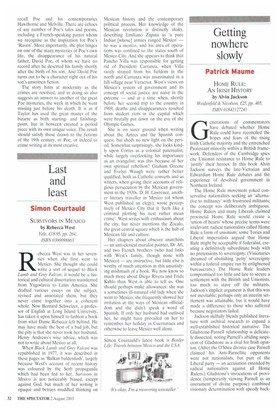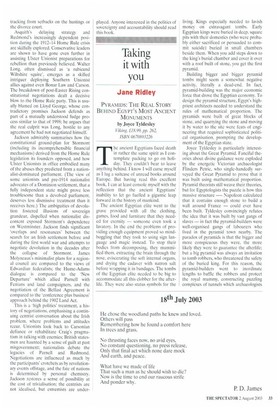Getting nowhere slowly
Patrick Maume
HOME RULE: AN IRISH HISTORY by Alvin Jackson Weidenfeld & Aricolson, £25, pp. 405, ISBN 01842127241 Generations of commentators have debated whether Home Rule could have reconciled the hopes and fears of the rising Irish Catholic majority and the entrenched Protestant minority within a British framework. Defenders of the Cambridge spies cite Unionist resistance to Home Rule to 'justify' their heroes. In this book Alvin Jackson surveys the late-Victorian and Edwardian Home Rule debates and the experience of devolved government in Northern Ireland.
The Home Rule movement yoked conservative nationalists seeking an 'alternative to militancy' with frustrated militants; the concept was deliberately ambiguous. Home Rulers and many Liberals claimed provincial Home Rule would create a 'union of hearts' whose precise terms were irrelevant; radical nationalists called Home Rule a form of unionism; some Tories and Liberal imperialists argued that Home Rule might be acceptable if federalist, creating a definitively subordinate body with no pretensions to sovereignty. (Visionaries dreamed of abolishing 'petty' sovereignty within a federal empire run by enlightened bureaucrats.) The Home Rule leaders compromised too little and late to secure a settlement with the British and Unionists, too much to stave off the militants. Jackson's implicit argument is that this was not inevitable; perhaps only an interim settlement was attainable, but it would have made a difference to those who suffered because negotiators failed.
Jackson skilfully blends published literature with archival research to expand a well-established historical narrative. The Gladstone-Parnell relationship is delicately dissected, noting Parnell's abiding suspicion of Gladstone as a rival for Irish opinion. (After the O'Shea divorce case Parnell claimed his Anti-Parnellite opponents were not nationalists, but part of the Liberal party — an accusation extended by radical nationalists against all Home Rulers.) Gladstone's invocations of providence (temporarily viewing Parnell as an instrument of divine purpose) combined visionary determination with speedy back tracking from setbacks on the hustings or the divorce court.
Asquith's delaying strategy and Redmond's increasingly dependent position during the 1912-14 Home Rule crisis are skilfully explored. Conservative leaders are shown to have gone even further in assisting Ulster Unionist preparations for rebellion than previously believed. Walter Long, often dismissed as 'a rubicund Wiltshire squire', emerges as a skilled intriguer deploying Southern Unionist allies against even Bonar Law and Carson. The breakdown of post-Easter Rising constitutional negotiations dealt a decisive blow to the Home Rule party. This is usually blamed on Lloyd George, whose contradictory promises Jackson defends as part of a mutually understood fudge process similar to that of 1998; he argues that the real culprit was Long, hostile to any agreement he had not negotiated himself.
Jackson admirably summarises how the constitutional ground-plan for Stormont (including its incomprehensible financial mechanisms) derived from the Home Rule legislation its founders opposed, and how Ulster Unionists in office embodied many of the abuses they predicted from a nationalist-dominated parliament. (The view of some unionists and pre-1914 nationalist advocates of a Dominion settlement, that a fully independent state might prove less troublesome than a devolved parliament, deserves less dismissive treatment than it receives here.) The ambiguities of devolution fostered illusions of sovereign grandeur, dispelled when nationalist discontent exposed Stormont's dependence on Westminster. Jackson finds significant 'overlaps and resonances' between the search for an Irish settlement before and during the first world war and attempts to negotiate devolution in the decades after the collapse of Stormont. James Molyneaux's minimalist plans for a regional council are compared to the views of Edwardian federalists; the Hume-Adams dialogue is compared to the 'New Departure' which allied Parnell with Fenians and land campaigners, and the negotiation of the Belfast Agreement is compared to the 'conference plus business' approach behind the 1902 Land Act.
This is a 'high politics' treatment, a history of negotiations, emphasising a continuing centrist conversation about the Irish problem, where problems and attitudes recur. Unionists look back to Carsonian defiance or rehabilitate Craig's pragmatism in talking with enemies; British statesmen are haunted by a sense of guilt at past misgovernment; nationalists debate the legacies of Parnell and Redmond. Negotiations are influenced as much by the participants' crotchets as by revolutionary events offstage, and the fate of nations is determined by personal chemistry. Jackson restores a sense of possibility at the cost of trivialisation; the centrists are not idealised, but extremists are under
played. Anyone interested in the politics of sovereignty and accountability should read this book.



























































 Previous page
Previous page